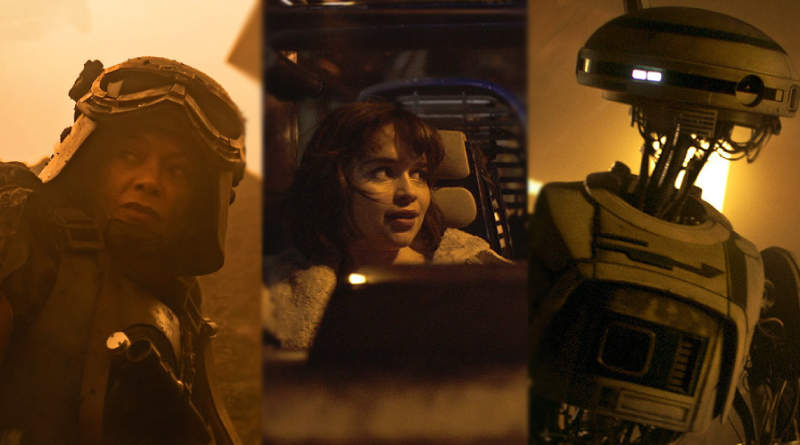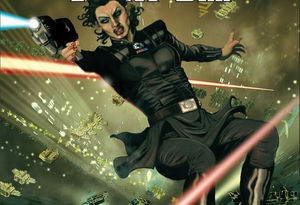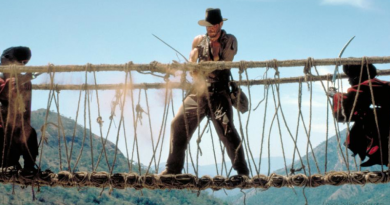The Good, The Bad, and The Less Than Great Choices – Looking at the Ladies of Solo: A Star Wars Story
Coming out of my first viewing of Solo: A Star Wars Story I distinctly remember thinking about how I much I was looking forward to when a woman gets to write one of these movies. Solo was a fun ride, but I couldn’t help reflecting on the treatment of the female characters once I left the theater and wondering how a woman might have approached them differently. This film has some really great moments and signs of progress in Star Wars films, but it also has issues – including ones that especially sting because they seem so easy to fix.
Warning: Spoilers abound for Solo: A Star Wars Story ahead.
Solo thankfully has a smattering of female minor and background characters. There’s Lady Proxima running the crime orphanage and the CorSec emigration officer who accepts a bribe. There are women throughout the spaceport including mothers and their children (who are sadly being separated from each other). Feminine passengers abound in the bar at the top of the space yacht. And women of all ages are among the inhabitants of Savereen. Showcasing more than one female character in significant roles who speak and have more than a minute or two of screen time may not be the highest bar to cross but it’s still always nice to see in this galaxy.
Val, played by Thandie Newton, is the first black woman to play a significant part in the Star Wars movies. Newton is a fantastic actor and clearly put her all into the role. It’s easy to say it’s sad that a character with so much presence and significance doesn’t get a lot of screen time, but there’s even more to it.
Good characters have something they want. It’s what they’re after, what’s driving them forward, a reason behind why they do what they do. Listen carefully leading up to the train heist and you’ll notice something different about Val. She doesn’t want anything. The rest of the heist crew – Beckett, Rio, Chewie, and Han – all get time to talk about why they’re doing this job – what it’ll do for them, what their plans are for after it. Beckett wants to return to Glee Anselm and play the valachord. Rio wants to open a cantina somewhere warm but not too warm. Chewie wants to find Imperial-displaced Wookiees and bring them home. Han wants to get a ship, return to Corellia, and save Qi’ra.
Val shares no desires or plans, just a brief chastisement of Beckett’s musical ambitions and prompts Han to reveal his wants. You could argue secondary characters’ desires aren’t as important, but then why let all the male-presenting characters express them and not Val? Even if she was just doing this to get to settle down with Beckett, she could have said that. I’d rather personally hear about her planning a climbing school or building custom swoop bikes. Heck, maybe she doesn’t even want to get out. Maybe she’s doing this because she likes the thrill.
During the heist Val holds up her end of the job at all costs. She lays the charges undetected, gives the rest of the group the heads up about Enfys Nest and the Cloud-Riders, and then destroys three viper droids to protect the rest of the crew after they trip the sensor that they specifically planned not to set off. She is, without a doubt, capable, competent, and confident. Pinned down by the remaining droids, she chooses to blow up the bridge while she’s still on it instead of being the one to further jeopardize an already severely jeopardized mission. On one hand, Val retains her agency through this, which is arguably a good thing for a character. On the other hand in storytelling terms the point of her death is clearly to force Beckett into spending more time with Han while creating conflict between the characters.
Now Val isn’t the only one to die in this scene. We’re picking up more characters and the Millennium Falcon cockpit only has so much room. So we lose Rio too. Although in addition to the same reasons for losing Val, the loss of Rio allows the audience to see Han’s concern for others and gives Han a chance to show his piloting skills. It’s unfortunate that the only woman on the crew and one of the two aliens present were the ones to go. And it makes it all the more interesting to consider what the movie would have been like if Val and Beckett switched roles. Instead once the other characters walk away from their memorial markers neither Val nor Rio are mentioned or referenced again.
Then we have Qi’ra (Emilia Clarke) – our female lead. She has some background similarities to Han. Much like Val she holds her own and is a fighter. They made sure it was literal too by having Qi’ra trained in Teräs Käsi – a form of hand-to-hand combat. She’s escaped Corellia and is not entirely thrilled with how she managed it, which is some nice complexity. As Dryden’s lieutenant it’s implied she’s proven herself as competent over the years and she gets more attention than the typical lieutenant trope that usually leaves a character in an organization like Crimson Dawn as the one to stand over to the side and order others to carry out the leader’s plans. The filmmakers refer to her as the femme fatale character though, with writer Lawrence Kasdan specifically citing her as “a duality in all of us, that we can be in love and we can wish for the best in people, and yet our own selfish drives may influence what happens.”
Theoretically this should make for a complicated and intriguing character but somehow the execution never quite gets there. Femme fatales tend to manipulate those around them, unafraid of seduction or rejecting whatever society prefers their role be. Femme fatales unapologetically claim their power. Qi’ra seems to be hanging on and riding the waves others make – just keeping her head above water, which is fine and admirable but different than the intention. Generally she comes off as just really uncomfortable a majority of the time. Mysterious and an enigma are words that also get thrown around a lot in interviews regarding this character. And those two words are more in line with what Qi’ra boils down to – she’s nebulous and she knows things. Because she spends so much of the movie hanging out behind that curtain, depth is mostly left to be insinuated through facial expressions.
When she makes her choice at the end of the movie, she’s been held at arm’s length for so long it’s not entirely clear what we’re supposed to see her as. Is she really a bad guy? Was she seeking power all along? Did she suddenly see an opportunity to get out from under the thumb and threat of Dryden? Does she feel like she’s in so deep that she has no choice? Is it because she’s convinced Han would really never accept her if he knew the things she’s done? Does she think it’s the best way to protect Han from the syndicate? The story seems to say it doesn’t matter; now look at Maul.
Once we knew Qi’ra was the romantic interest, I’m sure I wasn’t the only woman steeling herself for how that story ends in this movie. Of course Qi’ra had to part ways with Han at some point because she’s not in the other movies and Han marries Leia. Lazier writers might have just killed her off. And it probably would have been a case of fridging too – a female character death used to make the male character feel feelings and be motivated to do something. So in all the nebulousness of Qi’ra thank goodness we didn’t get that. Towards the end, the closest thing to a motivation that gets expressed by Qi’ra is a want to just stay in the game of life. It’s better than wanting nothing.
When Qi’ra talks to L3-37, Star Wars’ first feminine-coded droid to play a big part, it’s the closest the movie comes to passing the Bechdel Test before they revert to talking about the boys. I mean, I like Han and Lando and the Bechdel Test isn’t the be-all end-all of writing good female characters, but it doesn’t seem like it should be so difficult to pass. L3, played by Phoebe Waller-Bridge, brings such a great energy to play. She’s funny and so sure of who she is. Plus L3 has a very definite want – droid rights.
It’s a potential can of worms Star Wars hasn’t approached before. And it’s not a surprise that the film keeps the dive into it relatively shallow. The disappointing part though is how L3’s want is treated by the other characters. All of them are rather dismissive. Lando clearly listened at some point because he tells her she has to do what he wants because he’s her captain instead of her master, but otherwise the person she’s closest to sighs and rolls his eyes. One line of someone saying she has a point or asking her a question about it could have made it seem less like the film itself was saying equality doesn’t matter.
Fortunately not only does L3 have a clearly established drive, but she actually gets to realize it. There is a joy in watching her inciting a droid rebellion at that mine. Comedic visuals follow and the pride she radiates upon realizing what she’s done is contagious. It’s practical for the storytelling too because it allows her to achieve a personal win while also serving up the distraction that the team needs to have a better chance of escaping with their McGuffin. And then she’s dead.
It could be argued that this is a fridging meant to give Lando a reason to throw off his charm offensive and express distressed emotions. But L3’s death seems more so meant to serve plot points and trivia than another character. It gets Lando out of the pilot’s seat so Han can be the one to make the Kessel Run and ends up giving a reason other droids find the Falcon snarky in the future. There was already enough to make it apparent that this mission is dangerous; losing a crew member wasn’t necessary. And to top it off they then pull out her insides and upload her brain into the ship. It’s like she’s been revived but stripped of any agency she had. Again merely one additional line around this issue of it being what she wanted or an intention to pull her back out could have made an upsetting character treatment moment less so.
Then we have the other main female character Qi’ra talks to – Enfys Nest. Enfys has an amazing costume, a cool and powerful weapon, and can no doubt hold her own in a fight. Erin Kellyman, the actress who plays her, gives a a beautiful, impassioned performance in the relatively small amount of time she’s allowed to be the unveiled Enfys on-screen. She’s a woman of color too so it’s even more frustrating we didn’t get to see her earlier. For some reason someone or multiple someones decided she needed to be a mystery too though.
Enfys is masked and the pronoun “she” avoided for a reveal. None of the characters look particularly surprised when she removes her helmet. She’s hidden so the surprise can be for the audience – the surprise that she’s a girl. Except a young girl being a badass is not a surprise in this day and age. We’ve seen Leia unmasked as the bounty hunter in Return of the Jedi. We’ve seen Rey reveal herself as a woman and go on to hold her own in The Force Awakens and The Last Jedi. We’ve watched Wonder Woman and Katniss from The Hunger Games lead and fight relentlessly. Solo pauses though and is so ta-da about it that it could have been easy to feel like there was a bigger revelation there we somehow weren’t comprehending. But in that moment that’s all there is.
After that we get the surprise that does way more to subvert storytelling expectations – Enfys is not actually a villain. Some in-universe may disagree with that notion. Her motivation turns out to be deeper and more complex than the one originally presented of a bad guy who wants the goods with relatively less effort. She’s a rebel. She leads a team of beings that are representatives of worlds pillaged by the big bad guys. She may even be part of one of the early cells of the Rebellion, sharing information but operating independently. That’s pretty darn impressive and inspiring. Then on top of that we get one of those one extra lines that deepens her story as we learn she’s taken on this role after her mother. The expository is efficient storytelling in the limited time it has, but would have been even stronger if the girl reveal wasn’t tripping in front of it.
So if you’ve been keeping track, for our main female characters we have: one with presence and agency but no motivation, one who for mystery’s sake was kept a blank enough slate that you could argue how much presence and agency she has as well as what her motivation really was, one with presence and motivation but any agency she had gets taken away, and one with presence, motivation, and agency but she can’t be acknowledged as being female until the waning minutes of the movie for the sake of mystery. Meanwhile Han, Lando, Chewie, Beckett, and Dryden definitely have presence, clear motivation, and agency throughout the entire film.
There are so many things to enjoy while watching Solo. It can be a fun movie to watch. There are some great strides and moments for female characters. But there’s still plenty of room for improvement.
- Review: Doctor Aphra, An Audiobook Original (Star Wars) - July 26, 2020
- Review: Bonds of Brass by Emily Skrutskie - April 7, 2020
- Review: The Art of The Rise of Skywalker - March 31, 2020












Love your point about Enfys. In that scene, I kept waiting for there to be more to it — maybe she was Val and Beckett’s daughter?? Maybe she’s about to drop a crazy truthbomb that’s going to tie this whole thing together?? But no, she’s just a girl, and that’s supposed to gratify the ten-second pause before her line. Clearly Han and Beckett aren’t shocked by her identity; they make no mention of it and continue as if there is nothing unusual about her.
Thanks for this lovely, relevant take on the film.